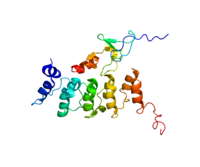
Photo from wikipedia
Malignant transformation is characterized by a phenotype "switch" from E- to N-cadherin - a major hallmark of epithelial to mesenchymal transition (EMT). The increased expression of N-cadherin is commonly followed… Click to show full abstract
Malignant transformation is characterized by a phenotype "switch" from E- to N-cadherin - a major hallmark of epithelial to mesenchymal transition (EMT). The increased expression of N-cadherin is commonly followed by a growing capacity for migration as well as resistance to apoptosis. Integrin Linked Kinase (ILK) is a key molecule involved in EMT and progression of cancer cells. ILK is known as a major signaling mediator involved in cadherin switch, but the specific mechanism through which ILK modulates N-cadherin expression is still not clear. Studies were carried out on human melanoma WM793 and 1205Lu cell lines. Expression of proteins was analyzed using PCR and Western Blot; siRNA transfection was done for ILK. Analysis of cell signaling pathways was monitored with phospho-specific antibodies. Subcellular localization of protein was studied using the ProteoExtract Subcellular Kit and Western blot analysis. Our data show that ILK knockdown by siRNA did suppress N-cadherin expression in melanoma, but only at the protein level. The ILK silencing-induced decrease of N-cadherin membranous expression in melanoma highlights the likely crucial role of ILK in the coordination of membrane trafficking through alteration of Rab expression. It is essential to understand the molecular mechanism of increased N-cadherin expression in cancer to possibly use it in the search of new therapeutic targets.
Journal Title: Cellular signalling
Year Published: 2020
Link to full text (if available)
Share on Social Media: Sign Up to like & get
recommendations!